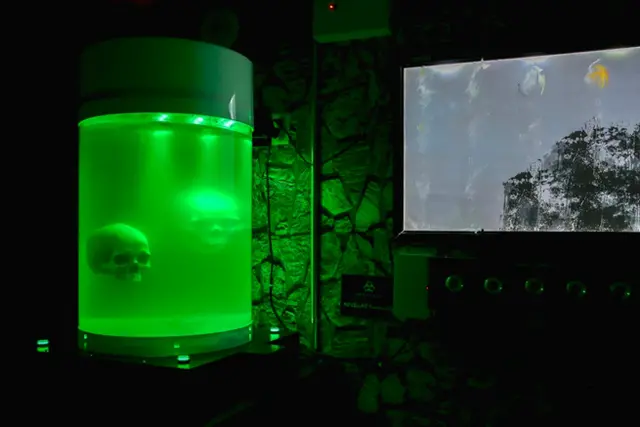Locked in a cramped, dim cell, Brett Soznik, along with Annette Brown and several other team members, was trying to bypass the green laser grid that separated them from an iron gate, a potential exit.
The clock was ticking down and their hearts were pounding.
It was a Tuesday afternoon in early spring in New York City, and their goal was to find a way out of the notorious military prison where a series killer once vanished. With minutes left, an escape seemed within reach as long as they did not touch the laser beaming.
To be clear, this was not the scene of Mission Impossible and their fate would not be sealed in the cell. Soznik and his teammates were in a room escape game in OMEscape New York, a franchise game store based in China, which opened in July in midtown Manhattan.
"It's really difficult. We needed a couple of hints along the way, but it gets your brain going, you have to work as a team. So it's a lot of fun," Soznik told Xinhua.
Escape Room is initially a point-and-click video game where players try to flee imprisonment by cracking riddles and puzzles in rooms. Real-life versions later emerged in Japan and took off around the world, especially in Asia.
"So the basic idea is you and your friends are locked inside the room, you have to observe what's going on inside. They are solving puzzles there, with clues and hints, and these will lead you to the next room. Eventually, you can successfully escape," said 26-year-old Huang Kai, manager of OMEscape New York.
About two-thirds of customers come here to throw a surprise birthday party for their friends or with their co-workers to build camaraderie, he said.
"We work in the same company, and we are trying to find a good way to work together, find somewhere outside the office, then we can kind of team built," Soznik said. "It was a great experience."
Many big companies, including Facebook and Google, are among the customers and a lot of stories come from their corporate events, Huang said.
"Facebook came here with their interns. They watched how the interns communicate and work with each other. I don't know if it is a factor in the decision to hire them or not," he said.
For Google, the game even sparked a "nice" competition between two groups that raced to pull it off within the allotted time, he said.
Designing such a game is no easy job. It requires a balance between engaging narratives and strong logic. Even a little tweaking with just one clue will affect the whole chain.
"It's like a chain affect. If you tuck in a hint, you will have to change the following steps to make sure their logic is consistent," said Huang. "But it's not just me thinking the puzzle, design the game. We have a strong team."
OMEscape, a franchise chain founded in Beijing, China in 2012 with 42 locations worldwide, has at least 20 full-time game developers, he said.
The company has an established "eco-system": the team keeps coming up with new ideas, translates them into physical versions with high-tech elements, intriguing narratives as well as traditional puzzles, and tests the games with customers before rolling out to the market.
The equipment of the game, which is designed and manufactured in China, is shipped over to the New York branch, said Huang, who believed they have several advantages over their competitors and planned to open another store at the end of the year.
"We are doing high-tech games. That's the trend," he said. "If it is just a simple lock, simple printout material, that won't last long. We are using a lot of high tech items in different games."
The green lasers in Penitentiary, the game Soznik and Brown played, is one example. In another space-travel-themed game, there is a radio broadcasting a message in Morse code to be deciphered.
While these high-tech add-ons give them an edge over other competitors, sometimes it's a double-edged sword.
"If your game is high-tech game, it means it's risky, coz something may go wrong. If you have just a simple lock here, there' s no way it can be wrong."
He still remembered that on the night before the store opened, a crucial equipment broke down and he fixed it till 4 o'clock in the morning.
"We are doing our best to improve the stability of the game, make sure there is no bug, all the equipment will work stably."
In the store, staff periodically checked in on the closed-circuit television, ready to hand out hints if needed.
In one room, a group of people fumbled with antiquated boxes and through books scattered along shelves. In another, some huddled together to discuss a strategy; others crawled into a drawer or examined pictures on the wall, trying to spot if there was any clue.
When a puzzle was resolved, cheers bursted out and rounds of applause could be heard out of the room.
"This business is bringing people happiness," Huang said. "That' s why most of the time the best award for me is hearing the customers say this is the best game I have ever played, this is the best birthday I have ever had."
Born and raised in China, Huang also took some pride in promoting the game, which he said has taken the lead among other game providers around the world.
"People think everything in China is copied from the U.S.. There are a lot of stuff we can bring from China to here, it's not C2C (copy to China) anymore. That's also why we are a little bit proud of ourselves. We bring the most fun experience in China to the U.S.."
 简体中文
简体中文

